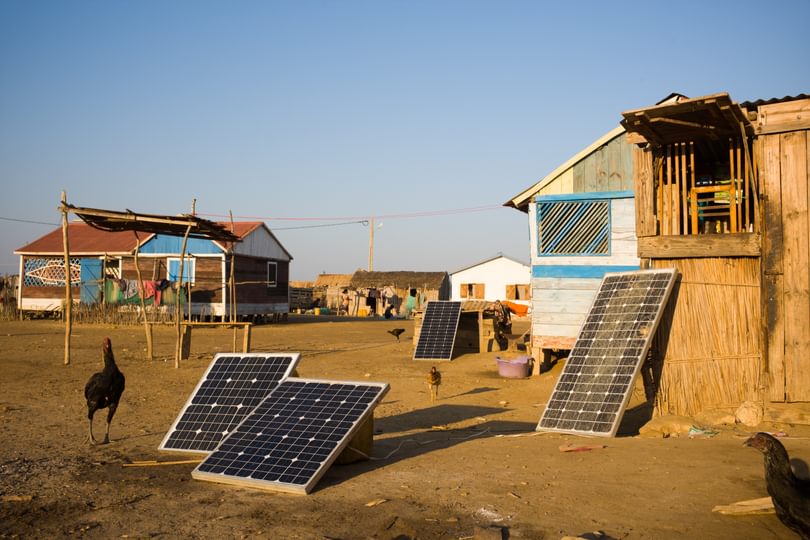
The 2022 Intergovernmental Panel on Climate Change (IPCC) report insists that we have options in all sectors to at least halve emissions by 2030, but the aim to limit global warming to less than 1.5 degrees is not going to happen unless radical steps are taken.
According to the report, average annual greenhouse gas emissions reached unprecedented highs in the last decade – but, positively, the report found that there is also increasing evidence of climate action. Nevertheless, this goal to drastically reduce global warming will not be feasible without a transformation of the energy sector. Energy systems (electricity and transport) are the largest global emitters – accounting for more than 66% of emissions. A Just energy transition is imperative for attaining climate goals. For instance, sustainable development goal (SDG) 7 on affordable and clean energy will not be achievable without accelerated integration of renewable energy around the world.

The IPCC report provides an updated global assessment of climate change mitigation progress and pledges and examines the sources of global emissions. It explains developments in emission reduction and mitigation efforts, assessing the impact of national climate pledges in relation to long-term emissions goals
The previous IPCC Report(pg 1261) asserted that energy systems encompass the entire energy value chain, from extraction, production, conversion, delivery, use of energy and decommissioning. Moreover, new perspectives on decarbonising the global energy system include energy-use sectors (electricity, industry, transport, and buildings) as key components of the system.
Simply, limiting global warming will require the energy sector to completely evolve. This will involve a substantial reduction in fossil fuel use, widespread electrification, improved energy efficiency, and use of alternative fuels (such as hydrogen).
The Just transition to a low carbon economy can be accelerated if we recognise who is most disenfranchised, involve them in decision making, and take collective remedial action through energy justice. Energy justice is a key principle of energy law that identifies disparities in energy systems and proposes reduction or reversal measures. It also provides a framework that helps to determine how best law and policy can respond to ensure there is greater equity in energy systems. These tenets and frameworks would not have emerged without growing concern about global energy inequalities. Similarly, the challenges of transitioning to a renewable energy also present opportunities for transforming the global energy sector. In the last decade, costs associated with renewables and batteries have plummeted by almost 90%, and are continuing to fall at an exponential rate.
A Just transition must consider livelihoods; but it is not just about jobs. Attempting to preserve work/labour in diminishing industries (fossil fuels) is short-term and myopic. It is simply unsustainable. Lasting jobs will most likely be found in ‘green’ sectors. However, because the world is still reliant on fossil fuels, there is an embedded global ecosystem of mining, manufacturing, transport, cities, villages, and institutions that are built and sustained by polluting fuels. This means that the proposal to a renewable energy future is an radical shift even for developed countries. For developing nations, the challenge is even greater.
One of the key outcomes of COP26 was the Political Declaration on the Just Energy Transition in South Africa. It mobilised an initial commitment of $8.5 billion to enable South Africa to become a leader in the Just energy transition by divesting from coal-fired power stations, investing in new low-emission generation capacity, increase energy efficiency, and pursue green industrialisation. This global effort explicitly acknowledged that sustainable financing from developed countries to developing ones is needed; emphasised the necessity of a just, equitable, and inclusive transition for workers and affected communities; and confirmed that the transition needs the full involvement of both public and private actors for a greener future.
Thus, technology and sustainable finance are critical enablers for accelerating decarbonisation strategies. Moreover, shared legal principles and co-operation (multi-disciplinary, multi-stakeholder, and multi-sectoral) can lead to the systemic changes needed in energy systems to make a low carbon future possible.
Climate change doesn’t just harm the environment, it diminishes the overall quality of life on earth. This means that climate change is one of the greatest impediments to attaining the sustainable development goals. However, the IPCC report also found that we CAN achieve a 50% emission reduction by 2030. It is, therefore, clear that we have the resources, knowledge, and technology to achieve our climate goals. What we need is the political framework to drive the transition. Law, policy, and regulation can be the foundation for this just transition to a low carbon global future by shaping the energy mix and nudging energy systems to be more sustainable.
This opinion piece reflects the views of the author, and does not necessarily reflect the position of the Oxford Martin School or the University of Oxford. Any errors or omissions are those of the author.
